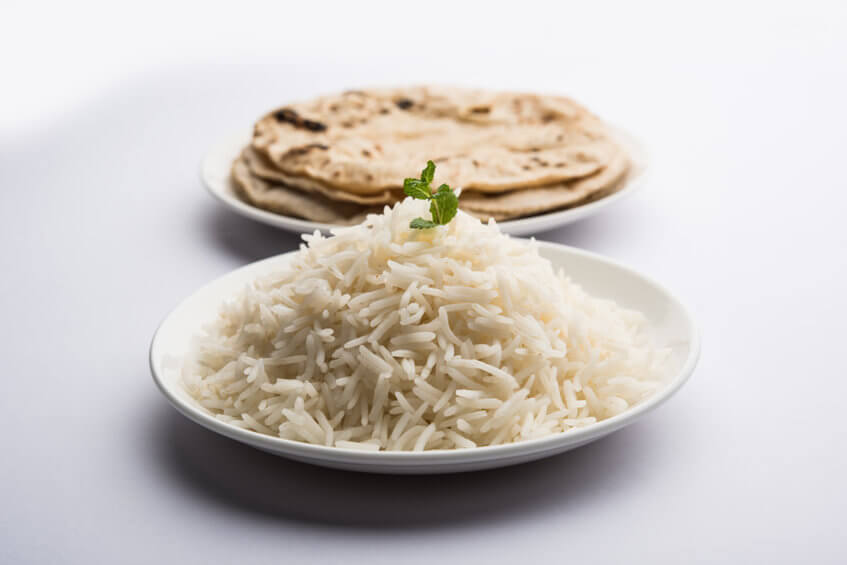If you’ve ever had Indian food, then chances are you’ve had the privilege of eating basmati rice. Native to India, this long-grain aromatic rice is traditionally the perfect base for curries and other thick, saucy dishes. Basmati rice also makes a fantastic rice pilaf. But other than being delicious, what are some basmati rice benefits?
16 Best Basmati Rice Benefits To Inspire Your Next Meal

Let’s have a look at some of the benefits…
1. Basmati Rice Is a Low Glycemic Food
While many types of rice (especially white rice) are a poor choice for people with diabetes, basmati rice is an alternative that may be a good choice for those who need to avoid low glycemic foods. This is because, when prepared properly, basmati has the lowest glycemic index of any rice.
Other varieties of rice are high glycemic, which means they will be quickly digested and metabolized by the body. This can destabilize the body’s blood sugar levels (especially for those with diabetes.)
In contrast, one of the basmati rice benefits is that it is digested and metabolized much slower, leading to more stable blood sugar levels. This makes it a great choice for people with diabetes, but be sure not to overcook your basmati rice! The longer it is boiled, the higher the glycemic index of this rice will go.
2. It Has 20% More Fiber Than Other Brown Rice Varieties
Brown basmati rice is high in both soluble and insoluble fiber. The soluble fiber slows gastric emptying, which in turn slows the whole digestive process and keeps you feeling full for longer periods. The insoluble fiber helps prevent constipation by adding bulk and assisting your digestive tract in moving waste.
Both of these types of fiber are very important for the overall health of your digestive system. Diets high in fiber can even reduce your risk of developing certain types of cancers, including colon cancer and breast cancer.
This type of diet can also reduce your risk of developing Type II diabetes. If you need more fiber in your diet, basmati rice is a great choice!
3. High in Vitamin B1
Another one of the basmati rice benefits is its high levels of vitamin B1 (also known as thiamine.)
This vitamin plays many important roles in the body, and it’s water-soluble—meaning that you must take in enough every day through your diet, as your body does not store it. Good thing basmati rice has approximately 22% of the recommended daily intake!
Often referred to as an “anti-stress” vitamin, B1 could help your body in stressful situations and strengthen your immune system. In addition, this vitamin helps your nervous system and brain function properly. Who knew that rice could be great for brain health?
4. Basmati Rice Is Low in Arsenic
Due to its unique growing conditions, many kinds of rice are high in arsenic (a natural element that can be highly toxic.) This is because arsenic is a problem in contaminated water, and rice is a semi-aquatic crop grown in water flooded “paddy fields.”
Thankfully, studies have shown that arsenic concentrations appear to be lowest in basmati rice.
Regardless of the low concentration, it is always a good idea to give your rice a good rinse or soak before cooking. This process helps reduce the amount of arsenic present in the grain.
You can also be careful about sourcing your rice—rice from India, Pakistan, and California consistently tests lowest for arsenic content.
5. Can Help With Weight Loss

If you’ve ever tried a low-carb diet, you may be surprised to learn that basmati rice can help you meet your weight loss goals. This is due in part to a specific starch called “amylose” within the grain that slows down digestion and increases satiety.
A slower digestive process can help you feel more full for longer, thus decreasing your hunger and, as a result, your caloric intake.
6. A Whole Grain
While white rice of any kind is considered a refined grain, brown rice is considered a whole grain. This is because, unlike white rice, brown rice is an intact kernel, containing the germ, the bran, and the endosperm.
This is good news, as eating whole grains has been linked to multiple health benefits, including lower risks of heart disease, cancer, and type II diabetes. This makes brown basmati rice a great health-conscious option to include in your diet!
7. White Basmati Rice Can Include More Vitamins
I can hear you asking, “wait…I thought brown basmati rice was better for you?” Well, don’t throw out your white basmati rice just yet.
In some cases that is true, but many modern forms of white basmati rice are enriched. This means that the manufacturer added vitamins and minerals during processing to help increase the typically low nutritional content of white rice.
Often, rice is enriched with iron, folic acid, and other beneficial nutrients. So if you’re concerned about choosing foods that help you meet your daily vitamin and mineral needs, consider picking up some enriched basmati rice on your next trip to the grocery store.
8. Basmati Rice Includes Eight Essential Amino Acids
After your body breaks down proteins, some of the elements that remain are called amino acids. These amino acids function within your body to grow, heal, and repair damaged tissues.
There are three types of amino acids, but the “essential” class of amino acids are the ones that the body cannot produce itself and must absorb from food. Rice contains eight of these essential amino acids, yet another reason why it is a great addition to a healthy diet.
9. High In Fiber
Fiber is the star of the show when it comes to Basmati rice— it is responsible for many of the basmati rice benefits.
Fiber is a type of carbohydrate that our bodies cannot break down. It passes through the digestive system without being absorbed. However, it serves an essential purpose.
Fiber aids digestion and fuels the good bacteria found in our gut. These bacteria need fiber to grow and populate our digestive systems, which, in turn, keeps us healthy.
Brown Basmati rice contains more fiber than white Basmati rice. This is because brown rice is less processed and contains more of the fiber-rich components of rice.
10. Plant-Based Iron
Iron is an essential mineral for synthesizing red blood cells and transporting oxygen throughout the body. Iron deficiencies are the most common causes of anemia, so it’s important to get enough of this micronutrient into your diet.
One serving (200g) of cooked basmati rice contains approximately 2.6mg of iron, which is almost 35% of your recommended daily intake! You can also buy enriched basmati rice, meaning that extra nutrients, such as iron, are added to the rice.
11. Complex Carbohydrate
Not all carbohydrates are bad for you! There are two general categories of carbohydrates— simple and complex.
While simple carbohydrates, such as refined white bread and candy, raise blood sugar levels and contain few nutrients, complex carbohydrates are, well, complex. They are usually high in fiber and other micronutrients, such as vitamins and minerals.
Complex carbs take longer to break down in the body, meaning they don’t increase blood sugar levels.
Basmati rice is a complex carbohydrate. Because they take longer to break down, complex carbs such as basmati rice also tend to keep you fuller for longer. This means you’ll have more sustained energy throughout the day.
12. Aids In Digestion
Fiber is an essential part of digestion. It helps prevent constipation, which can otherwise lead to discomfort and pain.
Most of us don’t eat enough fiber in a day, which can lead to irregular bowel movements. Basmati rice is an excellent addition to your diet if you need to increase your fiber intake and improve digestion.
Brown basmati rice contains more fiber than white basmati rice.
13. Antioxidants
Basmati rice is rich in selenium and manganese, two micronutrients that contain powerful antioxidant properties.
Antioxidants fight off disease-causing free radicals in the body. These free radicals damage cells and DNA, which can cause diseases such as cancer and heart disease.
On a less serious note, this damage also leads to premature aging and compromises skin health. One 200g serving of cooked basmati rice contains 14% of the daily recommended intake of selenium and 34% of the daily recommended intake of manganese.
14. Fragrant & Flavorful
Basmati translates to “fragrant” or “queen of fragrance” in Hindi. It has a unique aroma that is easily recognizable.
The aroma of basmati rice is nutty and sweet and has a scent similar to fresh popcorn when cooked. It also has a floral scent, making it truly unique and versatile.
The flavor complements most spices, and the light and fluffy texture makes it a perfect choice for curries, soups, pilafs, and other saucy dishes. Basmati rice is proof that rice doesn’t have to be a boring side dish— it gives a subtle luxurious taste to any meal.
15. Basmati Rice Has A Long Shelf Life
Basmati rice is a pantry staple. You should always have it at hand, and you never need to worry about the expiry date. Basmati rice has a long shelf-life— it can stay fresh and good as new for two years.
You can still eat it after that, but the flavor might be slightly compromised. Nevertheless, it essentially never goes off.
16. It’s Cheap!
Healthy eating can sometimes get expensive, but basmati rice is an excellent choice for both your health and wallet! Buy your basmati rice in bulk to save the most money.
Even though it has a unique flavor and aroma, basmati rice pairs well with many different cuisines and foods. Adding a serving of basmati rice to your meals provides a nutritious source of carbohydrates and fiber for little money. Pair it with any beans or legumes to get an inexpensive complete protein meal that contains all the essential amino acids.
Basmati Rice Benefits Are Plentiful
As you can see, there are many reasons why basmati rice is a wonderful addition to any diet; especially brown rice and enriched white rice.
It could be argued that basmati rice is the superior rice variety due to its low glycemic index, low arsenic content, high fiber content, and the many vitamins and minerals it contains. So the next time you’re at the grocery store, pick up some basmati rice and try it for yourself!

